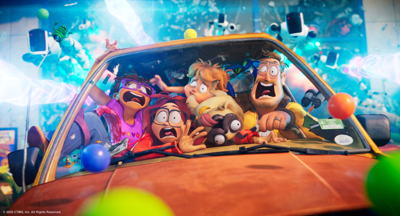
As silly as The Mitchells vs. the Machines may be in theory — a frenzied family of loveable weirdos takes on an evil Siri and her legion of robots bent on world domination — it touches a delicate nerve.
The disconnect between parents and children isn’t a new trope in storytelling. Since Jacob tricked Isaac with the bowl of Esau’s soup, kids and parents have always had tenuous relationships forged in love but complicated by misunderstanding. The digital divide only makes it harder. Whereas kids used to be misunderstood for their fashion sense and punk albums, they’re now forging new means of communication and relationships as smartphone age advances. If the movie Eighth Grade didn’t already cause parents to freak out over the ways kids’ formational communication patterns and social anxieties are changing, The Mitchells vs. the Machines might speed up the process.
If you took the techno-social commentary from Wall-e, the zippy family dynamics of The Incredibles and Eighth Grade’s awkward observations of teens in social crisis, and coated it all the bonkers anarchy of the Bird Up! sketches on The Eric Andre Show, then you’d be in the ballpark of what The Mitchells and the Machines has to offer. First-time feature director Michael Rianda, a Gravity Falls vet, brings together a deeply touching story about familial differences and does so with the renegade spirit that keeps original animation one of our most sacred spaces for unbridled creativity.
Animation really is a delicate space these days, dominated by Disney’s corporate professionalism and outliers who try to mimic the Mouse House as closely as they can. Cottage studios like Laika, Cartoon Saloon and Aardman continue to operate on the fringes, but rarely do they make a big impact. Right now, a movie in which a giant, evil robo-Furbie emitting Lovecraftian screeches of doom chases a family through a shopping mall is the top-watched film on Netflix. Somewhere, the algorithm broke, and this wonderfully weird movie about the bond of families and the technology that complicates it slipped through. It’s a sign that, while movie theaters are critical to the existence of movies, some films might benefit from going direct to audience, lest they get swallowed up by bigger fish in the theatrical pond.
It might seem weird to suggest a movie would do better without a theater — an uncomfortable suggestion that things might not ever fully return to how they once were. The Mitchells vs. the Machines, at its heart, is about a father and daughter who don’t understand each other, a pair that learns to better appreciate the love they have for each other when they’re willing to give changes in perspectives a chance. That kind of change is coming to the way we watch movies like this. The theater is hallowed ground, of course, but it’s going to have to be OK if some big-release movies go their own way on streaming to find their audiences. The Mitchells vs. the Machines is a great film, maybe the best animated film in years. It also might’ve flopped in theaters had it seen a conventional release. Sometimes, a little change can be a good thing, as badly as you want things to remain the same.





